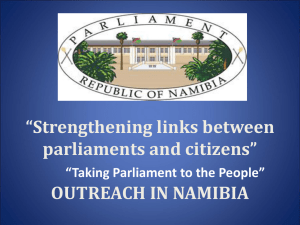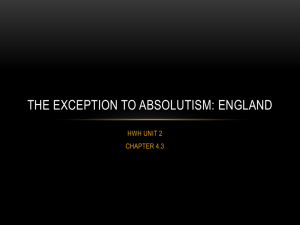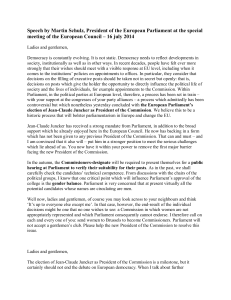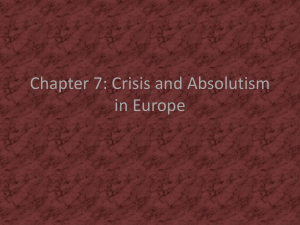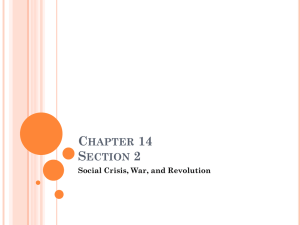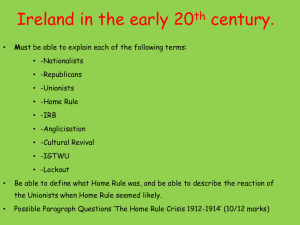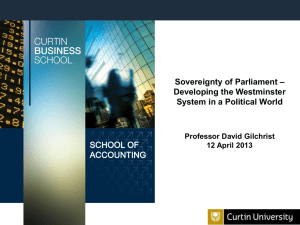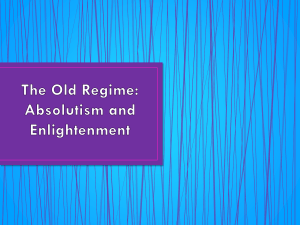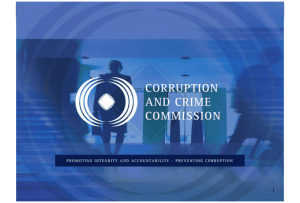Knowledge Framework for Parliamentarians Ideas for developing a
advertisement
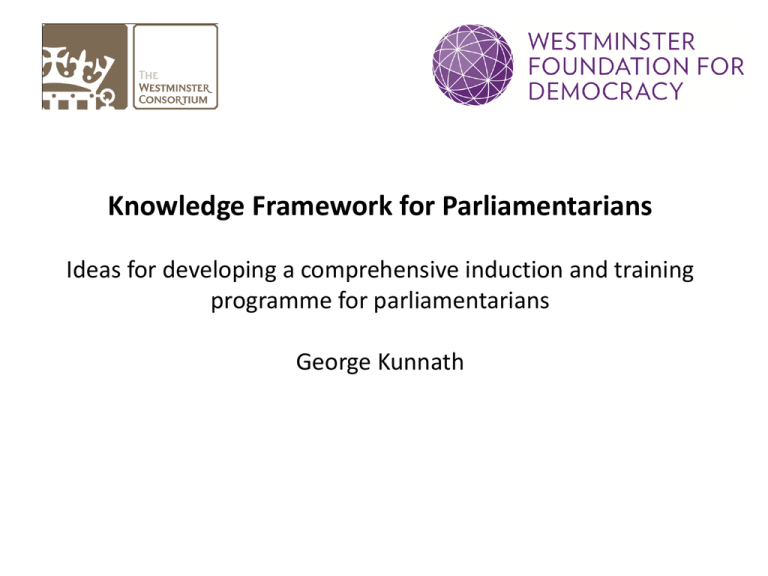
Knowledge Framework for Parliamentarians Ideas for developing a comprehensive induction and training programme for parliamentarians George Kunnath Reasons for inductions • The effectiveness of a parliament ultimately depends on the quality of its members. • Parliaments require members to all have a basic understanding of their processes in order to work within committees and the house. • Political Parties tend to choose the most electable candidate over the most capable candidate for elections. • Political parties themselves do not have the structures to develop future MPs. • As younger MPs enter parliament, they lack the experience that they should have gained in local or municipal councils. Main concerns with Induction Programmes • Induction programmes are usually very short and quite intense. Usually up to a week and members tend to leave overwhelmed with information. • They are often constructed quickly and tend to be a rush job. • They rarely move beyond the general information • They rarely bridge the gap between theory and practice. Background to the framework • Initiated by the South African Parliament during their 3rd Parliament and refined further during the 4th Parliament and the 9th Ugandan Parliament. • The framework is an approach to thinking about members development and then devising a plan to ensure that there are adequate options to develop members capacities Starting Principles for developing and using the framework • Take the long term view, on average a new MP takes two years before they fully know their way around parliamentary process. • Be flexible, realising people are at different levels. Some new, some returning and some experts. • Recognise the role of the political parties and gain their buy-in to the process • Plan early Plan Schedule Implement Evaluate Building the Knowledge Framework What knowledge is required by the members in committees to immediately be efficient and effective? What knowledge does a member need to understand the processes/ business of Parliament in order to be effective? What personal knowledge does a member need to immediately settle and function in Parliament? (personal level) What personal knowledge does a member need to immediately settle and function in Parliament? (personal level) 1 Benefits and Policies Benefits and Policies L19 Pension Benefits Remuneration Housing Medical Travelling Telephones Tax/ SARS Other 2 Personal Management Personal Management & Development Members code of ethics Personal financial Management Speed reading Analysis & Deductive Reasoning Public Speaking Speech writing Time Management Introduction & tour of Cape Town Tour of Parliament 3 ICT Skills IT skills required to function in Parliament Basic computers user Email MS Office Website and intranet PCMS Unified Communication Voting system (NA/NCOP) Sound system (Microphones and Interpreting) 4 Protocol Protocol training Order of Precedence Forms of address Protocol guide Writing & Communication tools What knowledge does a member need to understand the processes/ business of Parliament in order to be effective? 1 Constitutional Democracy 4 Core Business Constitutional Democracy The Constitution Human Rights Governance: - Parliament, - Executive, Judiciary Legislation How do we pass legislation? 2 Parliament Oversight How do committees work Oversight model Parliament Functions of Parliament Rules and procedures (NA & NCOP) Powers, Privileges & Immunities 3 Strategy/IRP Strategic overview Mission Vision Values Core Objectives Strategic planning process Core Business Public Participation How and what ? Annual Events of Parliament Public Hearings etc. International Participation Bodies Parliament is involved with: PAP, SADC PF, IPU , ACP-EU,CPA etc Study tours Regional issues Global issues Role of PGIR Cooperative government Appointments International agreements Institutions supporting democracy etc. 5 Parliamentary Service Parliamentary Service Structure Services National Assembly Division National Council of Provinces Division Institutional Support Division Legislation and Oversight Division Financial Management Office Office of the Secretary to Parliament Corporate Services Division Human Resources What knowledge is required by the members in committees to immediately be efficient and effective in Parliament? 1 General Duties 3 Per Committee/Cluster Per cluster General Introduction to the cluster Presentation by 3rd Parliament chairpersons - Legacy issues Specialist presentations on current issues - academic/expert Presentation by Reseacher Presentation by Content Specialists Presentation by departments Duties and functions of committees Planning and budgeting for committees Best practice in committees 2 Chairperson Role Chairperson Training 4 Role of Chairperson Meeting management Role of House Chairperson committees Oversight Tools Oversight Tools Budget and Finance process Institutional Mechanisms Site Visits/Public Hearings Scheduling Induction and training programmes • Think long term: It takes on average two years to develop a new member of parliament, so plan interventions spread over a two year period. • Keep the principles and information stage short and the materials light. • Have sufficient entry and exit points in your programme. • Use a diversity of modes to deliver the training, be creative. Lecture mode tends to be the least popular mode of delivery. Cultural differences should also be taken into consideration. • Schedule the induction activities as soon as the dates for the elections, swearing-in and first sessions of parliament have been determined. • Be aware of training fatigue. Modes of delivery • A short week long induction for new members of parliament. • Peer-to-peer workshops with parliamentarians from neighbouring countries and further afield. • Presentations of case studies • Study visits to different parliaments • Sister party and cross party workshops • Committee planning sessions • Thematic workshop and presentations by civil society groups • Mentoring by former chairpersons and members • Manuals and handbooks • Support to formal academic programmes should a member seek to specialise in a specific area of knowledge. Advantages • The framework is a good logical approach to planning and tends to get good results. • The approach is owned by the institution • Its easily understandable and is a good donor coordination tool • It shifts the concept of induction from one event to many events over a year or two programme. • It allows for innovative approaches • It encourages repetition Challenges and the way forward • Develop a comprehensive M&E tool that can be used to track members’ effectiveness over the term of a parliament. • Consider inclusion of more specific knowledge required by groups such as women members, accountability committees, human rights committees etc. • Broaden the base of thematic knowledge that applies to all members such as the inclusion of MDGs. • Apply it in two more countries before the end of the TWC programme • Strengthen its use as a donor coordination tool
